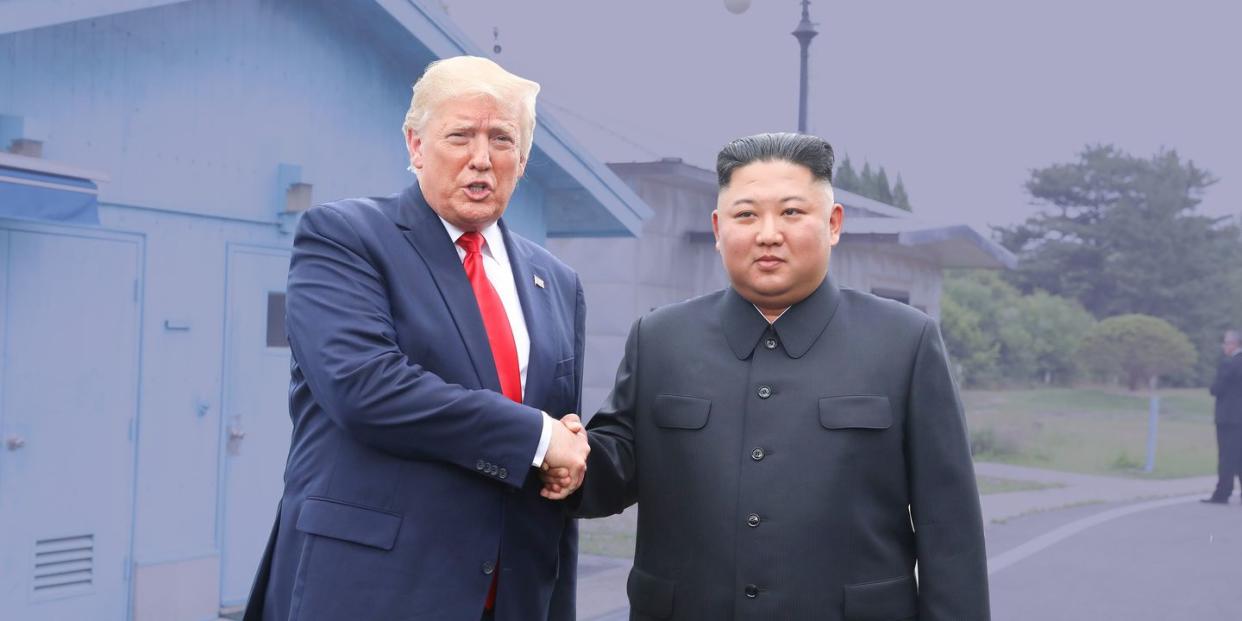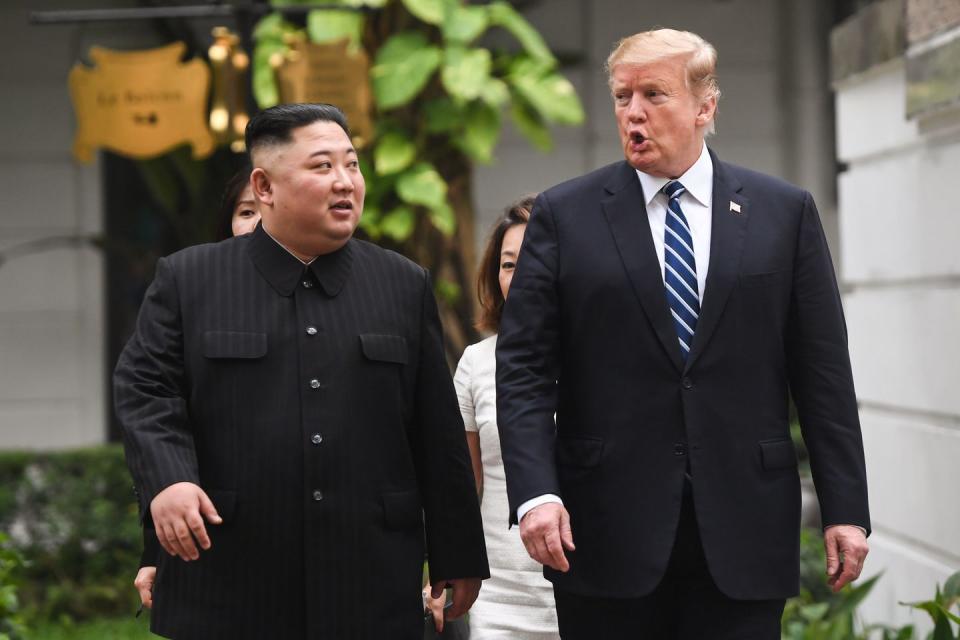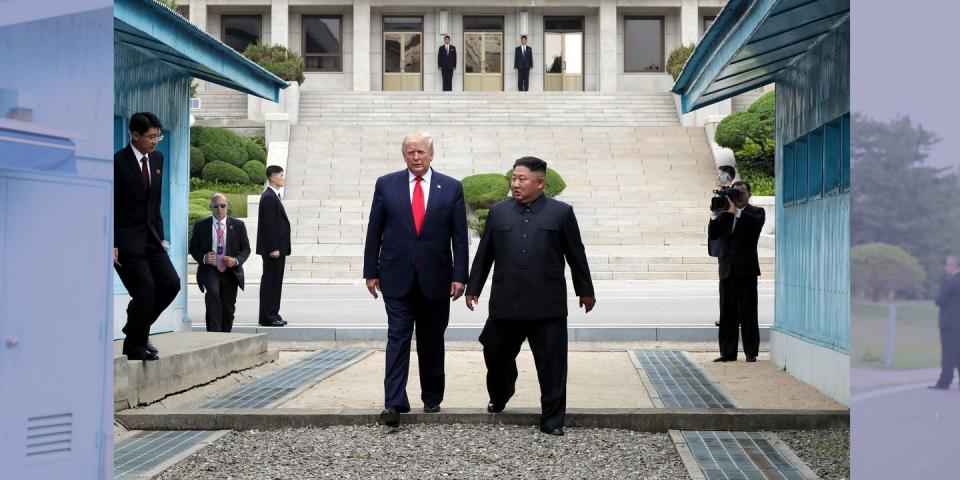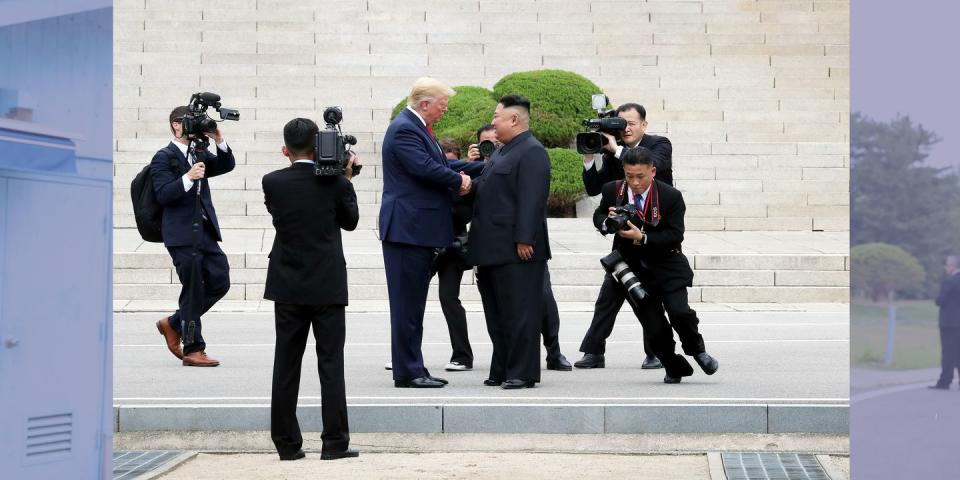Who’s Playing Whom? Trump’s Unrequited Kim Jong-Un Obsession Is About One Thing

Only Losers Need Practice
In June 2018, at the first U.S.-North Korea summit, in Singapore, Trump made an announcement that surprised even his senior-most military officials. That year’s large-scale military exercises with South Korea would be suspended. The exercises, known as “Key Resolve” and “Foal Eagle,” had taken place every spring for years and involved thousands of troops from all branches of the US and South Korean military services. US and South Korean military officials considered them essential training to prepare for and deter a North Korean invasion.
Trump had a different view. He described what he called “war games”—a term the US military intentionally avoids—as a waste of money and an unnecessary provocation. “We will be stopping the war games, which will save us a tremendous amount of money,” he said in a post-summit news conference, in which he also accused ally South Korea of not sharing the costs. “We have to talk to them. We have to talk to many countries about treating us fairly.” The president went on to cite his own expertise as owner of a private jet as contributing to his decision. “I know a lot about airplanes,” he continued. “It’s very expensive. I didn’t like it.” He then cited another reason for canceling the exercises: avoiding upsetting Kim Jong Un: “I think it is very provocative.”

Such exercises are routine by design—their predictability is seen as essential to avoid escalation. Every exercise is vetted through multiple levels of US military leadership. And leaders at every one of those levels—from field commanders to the senior-most Pentagon officials—must be in agreement before proceeding. Since North and South Korea technically remain at war, reducing the risk of miscommunication is of particular concern. If an exercise is to be canceled, the president is expected to make such a decision in consultation with the Pentagon, US commanders in the region, and South Korea.
But when Trump made his announcement that day in Singapore, his commanders were hearing the news for the first time. The South Korean Ministry of National Defense issued a short statement indicating that it was seeking confirmation from the United States. US forces in South Korea said that they were still moving forward with planning for the exercises. The Pentagon, for its part, issued a statement saying simply that it would do what the president said. Two months later, Secretary of Defense Mattis seemed to register his opposition to the decision. “We took the step to suspend several of the largest exercises as a good-faith measure coming out of the Singapore summit,” he told reporters at the Pentagon. “We have no plans at this time to suspend any more exercises.”
The next day, Trump rebutted Mattis in a series of tweets headlined as a “STATEMENT FROM THE WHITE HOUSE”: “. . . the President believes that his relationship with Kim Jong Un is a very good and warm one, and there is no reason at this time to be spending large amounts of money on joint U.S.-South Korea war games,” he wrote. “Besides, the President can instantly start the joint exercises again with South Korea, and Japan, if he so chooses. If he does, they will be far bigger than ever before.”
Four months later, Mattis resigned from his post, following Trump’s snap decision to withdraw US troops from Syria. In his resignation letter, addressed to the president, Mattis noted his “core belief ” in the necessity and importance of the United States’ alliances:
“One core belief I have always held is that our strength as a nation is inextricably linked to the strength of our unique and comprehensive system of alliances and partnerships. While the US remains the indispensable nation in the free world, we cannot protect our interests or serve that role effectively without maintaining strong alliances and showing respect to those allies."

Who Needs Friends?
After the next summit with North Korea, in Hanoi in February 2019, Trump once again suspended large-scale military exercises. “I was telling the generals, I said, ‘Look, you know, exercising is fun and it’s nice and they play the war games,’” he said. “And I’m not saying it’s not necessary because at some levels it is, but at other levels it’s not.”
In November, as the House considered impeaching him for withholding military aid from Ukraine in return for political favors, Trump summarily demanded that Seoul immediately increase its contribution to the costs of the deployment of US forces on the Korean Peninsula fivefold. When South Korean officials balked at the number, US officials walked out of the room.
South Korea struck several advisors as a particularly strange target. The country has the eighth largest military budget in the world and is the third largest purchaser of American weapons. Unlike many NATO countries, it spends well over 2 percent of its GDP on defense.
Such decisions are the president’s. He is the commander in chief. Military leaders are required to follow his orders. However, determining the line marking the presidential decisions that go too far—the orders they will not follow or attempt to reverse —has proven deeply difficult for men and women in uniform. Is the line the cancellation of one crucial military exercise? Or the cancellation of several? Is the line the withdrawal of some US forces an ally depends on? Or all of them? In South Korea, no single questionable decision or collection of questionable decisions seemed to define that line.

In the midst of the coronavirus pandemic, in 2020, the president played hardball with South Korea once again. On April 1, the United States furloughed thousands of South Koreans who work on US bases, after Seoul and Washington failed again to reach a new cost-sharing agreement. The commander of US troops in South Korea called these employees “vital” to the mission and the US-South Korea alliance.
There are broader dangers to Trump’s undermining of the United States’ relationship with South Korea: A widening gap between the two allies will lead the South to move closer to other players in the region. “When you talk to the South Koreans, they are in the middle of US and China,” says Sue Mi Terry, an intelligence analyst who covered North Korea for the CIA and the National Security Council. “China is South Korea’s number one trading partner. Their trade volume is more than US, South Korea, and Japan combined. South Korea is already pursuing a hedging policy between the US and China.”
The United States’ position as an Asian regional power depends in large part on the strength of its alliances with its two principal allies in the region: South Korea and Japan. Each hosts large contingents of US forces, and each country’s military serves as an essential piece of the US military deterrent against China. Weakening those links weakens the United States and strengthens China—yet another example of “America First” undermining its own agenda.
Progress...But Whose?
While South Korea suffered under Trump, North Korea gave little ground. Trump’s concessions on military exercises failed to generate reciprocal concessions from North Korea on its nuclear program. And that was the inherent problem: Trump was ceding important ground to Kim without receiving in return anything on his principal demand of denuclearization.
In November 2019, the International Atomic Energy Agency expressed its alarm at North Korea’s continuing nuclear activities. Noting that North Korea—nearly two years into President Trump’s diplomatic efforts—was still in violation of UN Security Council resolutions regarding its nuclear and missile programs, the IAEA’s acting director, Cornel Feruta, demanded that Pyongyang take immediate action to curtail its program.
As Trump entered his fourth year in office, North Korea appeared increasingly emboldened. “One thing that is misunderstood on both sides is that the North Korean elite—they feel they have hugely succeeded in their weapons development,” says Joseph Yun, who, as Trump’s special representative for North Korea policy, was often the main contact between the administration, South Korea, and the DPRK. That success created a new confidence inside the North Korean leadership and a new dynamic in any nuclear negotiations going forward.
“Whose side is time on?” he asked. “Everyone used to say that time is on America’s side. And again, that’s very debatable, because as time elapses, you’re going to have North Koreans accumulate more and more weapons. And so the price keeps on going up.”

Eyes on the Prize
Current and former Trump administration officials who have interacted with Trump on North Korea say that the president recognizes the change in Pyongyang’s posture and has made substantive adjustments as a result. “I think he has an understanding of it, more than people give him credit for,” Yun says. “This is a lesson he learned from Hanoi, which is that you cannot do all negotiations at a summit setting.” Still, the president continues to see the summits as “wins” in their own right. “I believe he takes great pride in this issue,” Yun says. “He takes pride that he has accomplished something.”
North Korea is a matter of such personal pride for Trump that he has a deep personal desire for international recognition for his efforts, bestowed upon him in a very tangible way. “You cannot underestimate that he wants to win a Nobel Peace Prize,” Yun says. “He felt that Obama had won it for doing nothing and that he deserves to win, and North Korea is going to be his ticket.”
The president’s desire for such recognition leads some current and former administration officials to fear how much he will sacrifice in pursuit of that personal goal. “Too much would include, in my view, giving up all the sanctions before denuclearization is completed,” Yun cautioned. “Giving up too much is removing US troops from South Korea. Giving up too much would be disestablishing what’s called UN command. Giving up too much would be recognizing North Korea as a nuclear-weapon state.”
What about the Trump administration’s original standard for success in these negotiations? The four words repeated ad infinitum at the start of the talks—“Complete, verifiable, irreversible denuclearization”—have faded into memory.

Who's Playing Whom?
President Trump made a gamble on North Korea. He believed that by building a personal relationship with Kim, coupled with economic sanctions, he could cajole North Korea into making concessions on its nuclear program. At the end of four years of summit diplomacy and maximum pressure, that gamble has not paid off. In fact, there is evidence that North Korea used that time to expand, rather than freeze, its nuclear program.
In this sense, it may end up being Kim who played Trump, not the other way around.
This article is adapted from The Madman Theory, published by Harper, an imprint of HarperCollins, August 11th, 2020. Copyright © by Jim Sciutto.
You Might Also Like


